An Exploration of Humanities: Its Importance in Daily Life
VerifiedAdded on 2022/11/16
|10
|2824
|345
Essay
AI Summary
This essay provides a comprehensive overview of humanities, exploring its definition, historical development, and significance in human life. It begins by defining humanities as the study of human experience, society, and the relation of human beings to the world, tracing its roots from ancient civilizations to the Renaissance, Enlightenment, and modern periods. The essay discusses the evolution of humanities as a distinct academic discipline, contrasting it with natural and social sciences while highlighting its interdisciplinary nature. It examines the various aspects of humanities, including philosophy, literature, history, and art, and their relevance to daily life. The essay addresses criticisms and apprehensions about the discipline, emphasizing its enduring value in shaping human understanding and providing critical analytical skills. The paper concludes by underscoring the importance of humanities in fostering critical thinking, shaping human character, and enhancing employability, thus establishing its continuing significance in contemporary society. The essay emphasizes the need to understand the value of studying humanities and how it influences human understanding to explain and comprehend societal elements.
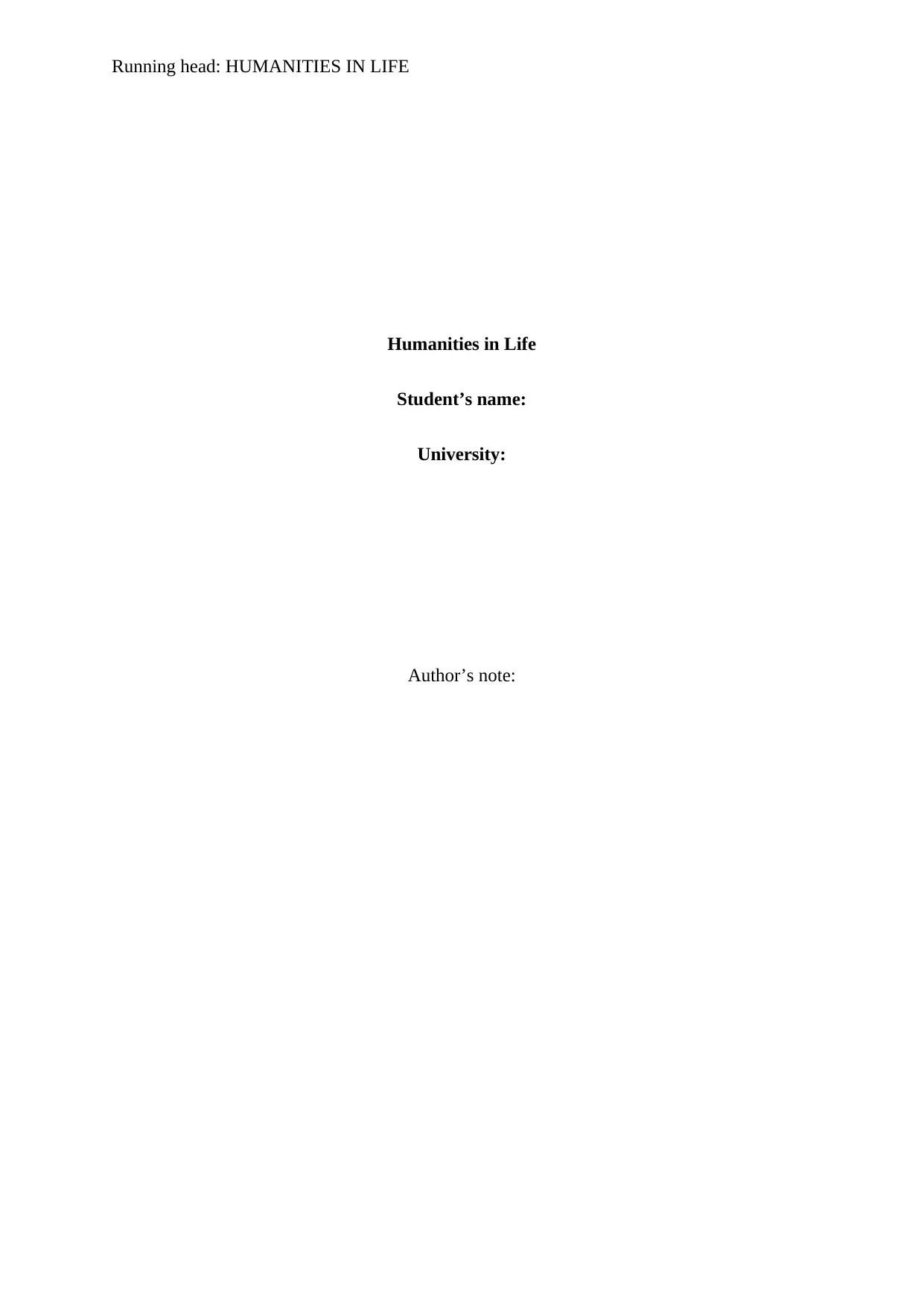
Running head: HUMANITIES IN LIFE
Humanities in Life
Student’s name:
University:
Author’s note:
Humanities in Life
Student’s name:
University:
Author’s note:
Paraphrase This Document
Need a fresh take? Get an instant paraphrase of this document with our AI Paraphraser
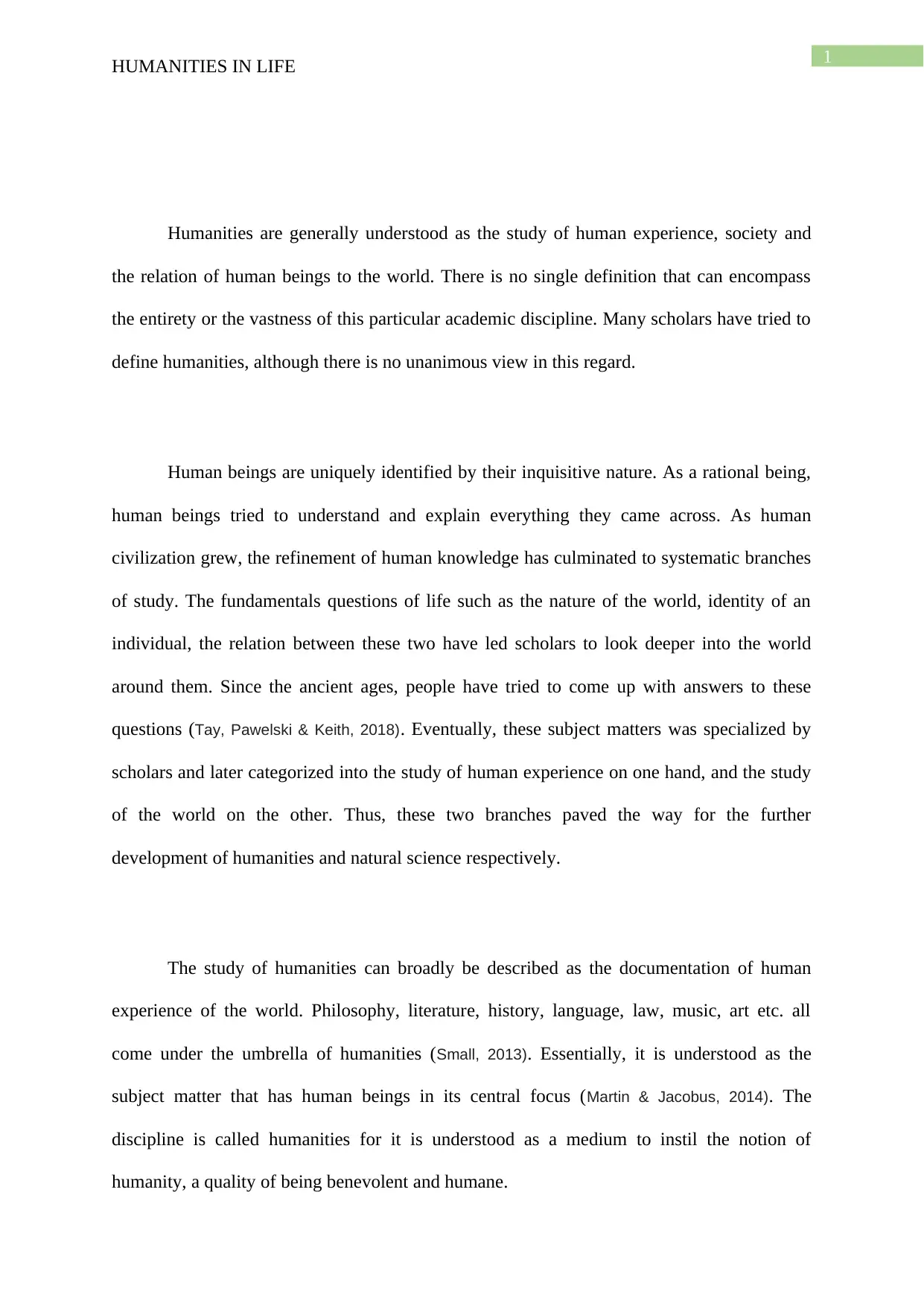
1
HUMANITIES IN LIFE
Humanities are generally understood as the study of human experience, society and
the relation of human beings to the world. There is no single definition that can encompass
the entirety or the vastness of this particular academic discipline. Many scholars have tried to
define humanities, although there is no unanimous view in this regard.
Human beings are uniquely identified by their inquisitive nature. As a rational being,
human beings tried to understand and explain everything they came across. As human
civilization grew, the refinement of human knowledge has culminated to systematic branches
of study. The fundamentals questions of life such as the nature of the world, identity of an
individual, the relation between these two have led scholars to look deeper into the world
around them. Since the ancient ages, people have tried to come up with answers to these
questions (Tay, Pawelski & Keith, 2018). Eventually, these subject matters was specialized by
scholars and later categorized into the study of human experience on one hand, and the study
of the world on the other. Thus, these two branches paved the way for the further
development of humanities and natural science respectively.
The study of humanities can broadly be described as the documentation of human
experience of the world. Philosophy, literature, history, language, law, music, art etc. all
come under the umbrella of humanities (Small, 2013). Essentially, it is understood as the
subject matter that has human beings in its central focus (Martin & Jacobus, 2014). The
discipline is called humanities for it is understood as a medium to instil the notion of
humanity, a quality of being benevolent and humane.
HUMANITIES IN LIFE
Humanities are generally understood as the study of human experience, society and
the relation of human beings to the world. There is no single definition that can encompass
the entirety or the vastness of this particular academic discipline. Many scholars have tried to
define humanities, although there is no unanimous view in this regard.
Human beings are uniquely identified by their inquisitive nature. As a rational being,
human beings tried to understand and explain everything they came across. As human
civilization grew, the refinement of human knowledge has culminated to systematic branches
of study. The fundamentals questions of life such as the nature of the world, identity of an
individual, the relation between these two have led scholars to look deeper into the world
around them. Since the ancient ages, people have tried to come up with answers to these
questions (Tay, Pawelski & Keith, 2018). Eventually, these subject matters was specialized by
scholars and later categorized into the study of human experience on one hand, and the study
of the world on the other. Thus, these two branches paved the way for the further
development of humanities and natural science respectively.
The study of humanities can broadly be described as the documentation of human
experience of the world. Philosophy, literature, history, language, law, music, art etc. all
come under the umbrella of humanities (Small, 2013). Essentially, it is understood as the
subject matter that has human beings in its central focus (Martin & Jacobus, 2014). The
discipline is called humanities for it is understood as a medium to instil the notion of
humanity, a quality of being benevolent and humane.
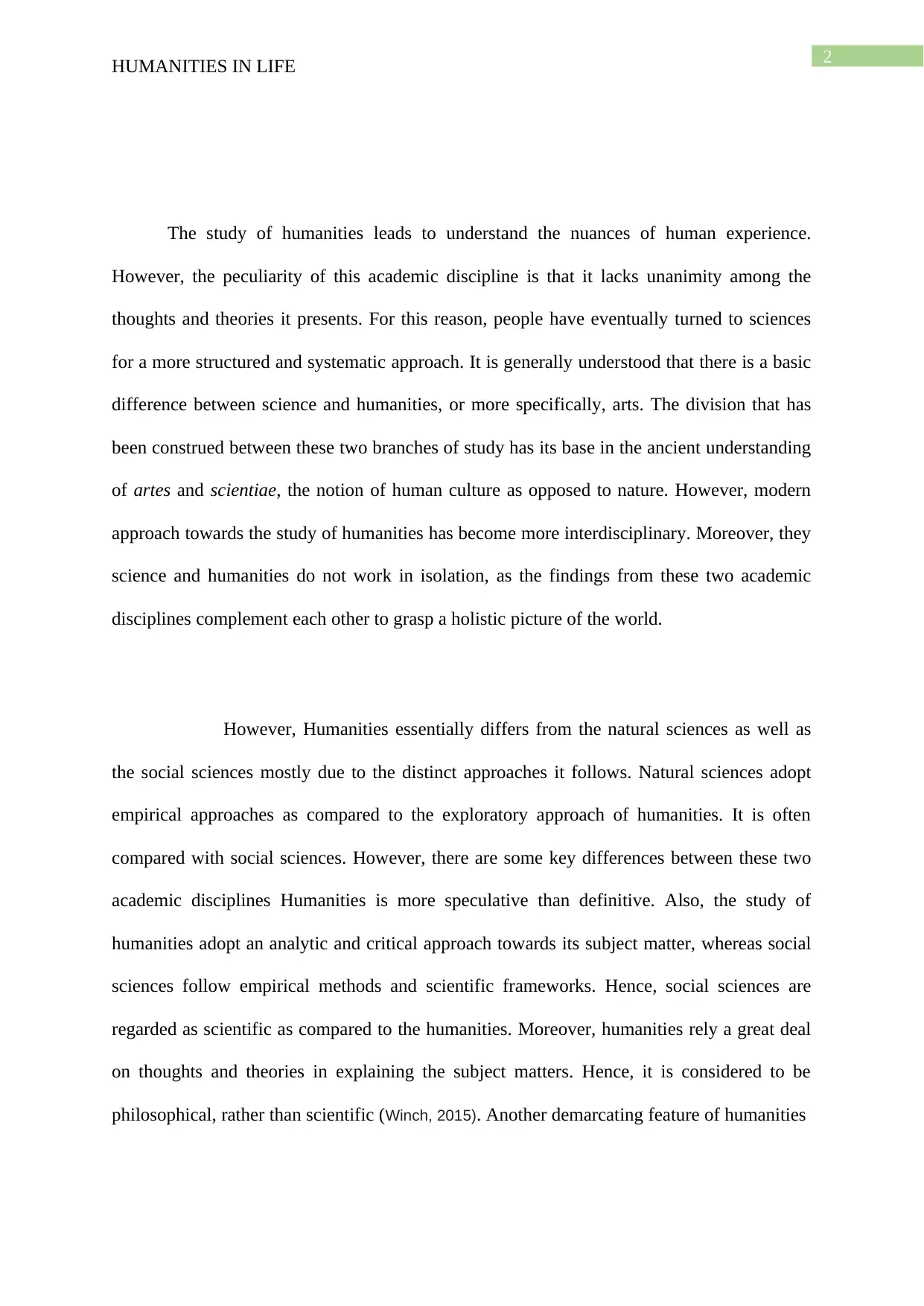
2
HUMANITIES IN LIFE
The study of humanities leads to understand the nuances of human experience.
However, the peculiarity of this academic discipline is that it lacks unanimity among the
thoughts and theories it presents. For this reason, people have eventually turned to sciences
for a more structured and systematic approach. It is generally understood that there is a basic
difference between science and humanities, or more specifically, arts. The division that has
been construed between these two branches of study has its base in the ancient understanding
of artes and scientiae, the notion of human culture as opposed to nature. However, modern
approach towards the study of humanities has become more interdisciplinary. Moreover, they
science and humanities do not work in isolation, as the findings from these two academic
disciplines complement each other to grasp a holistic picture of the world.
However, Humanities essentially differs from the natural sciences as well as
the social sciences mostly due to the distinct approaches it follows. Natural sciences adopt
empirical approaches as compared to the exploratory approach of humanities. It is often
compared with social sciences. However, there are some key differences between these two
academic disciplines Humanities is more speculative than definitive. Also, the study of
humanities adopt an analytic and critical approach towards its subject matter, whereas social
sciences follow empirical methods and scientific frameworks. Hence, social sciences are
regarded as scientific as compared to the humanities. Moreover, humanities rely a great deal
on thoughts and theories in explaining the subject matters. Hence, it is considered to be
philosophical, rather than scientific (Winch, 2015). Another demarcating feature of humanities
HUMANITIES IN LIFE
The study of humanities leads to understand the nuances of human experience.
However, the peculiarity of this academic discipline is that it lacks unanimity among the
thoughts and theories it presents. For this reason, people have eventually turned to sciences
for a more structured and systematic approach. It is generally understood that there is a basic
difference between science and humanities, or more specifically, arts. The division that has
been construed between these two branches of study has its base in the ancient understanding
of artes and scientiae, the notion of human culture as opposed to nature. However, modern
approach towards the study of humanities has become more interdisciplinary. Moreover, they
science and humanities do not work in isolation, as the findings from these two academic
disciplines complement each other to grasp a holistic picture of the world.
However, Humanities essentially differs from the natural sciences as well as
the social sciences mostly due to the distinct approaches it follows. Natural sciences adopt
empirical approaches as compared to the exploratory approach of humanities. It is often
compared with social sciences. However, there are some key differences between these two
academic disciplines Humanities is more speculative than definitive. Also, the study of
humanities adopt an analytic and critical approach towards its subject matter, whereas social
sciences follow empirical methods and scientific frameworks. Hence, social sciences are
regarded as scientific as compared to the humanities. Moreover, humanities rely a great deal
on thoughts and theories in explaining the subject matters. Hence, it is considered to be
philosophical, rather than scientific (Winch, 2015). Another demarcating feature of humanities
⊘ This is a preview!⊘
Do you want full access?
Subscribe today to unlock all pages.

Trusted by 1+ million students worldwide
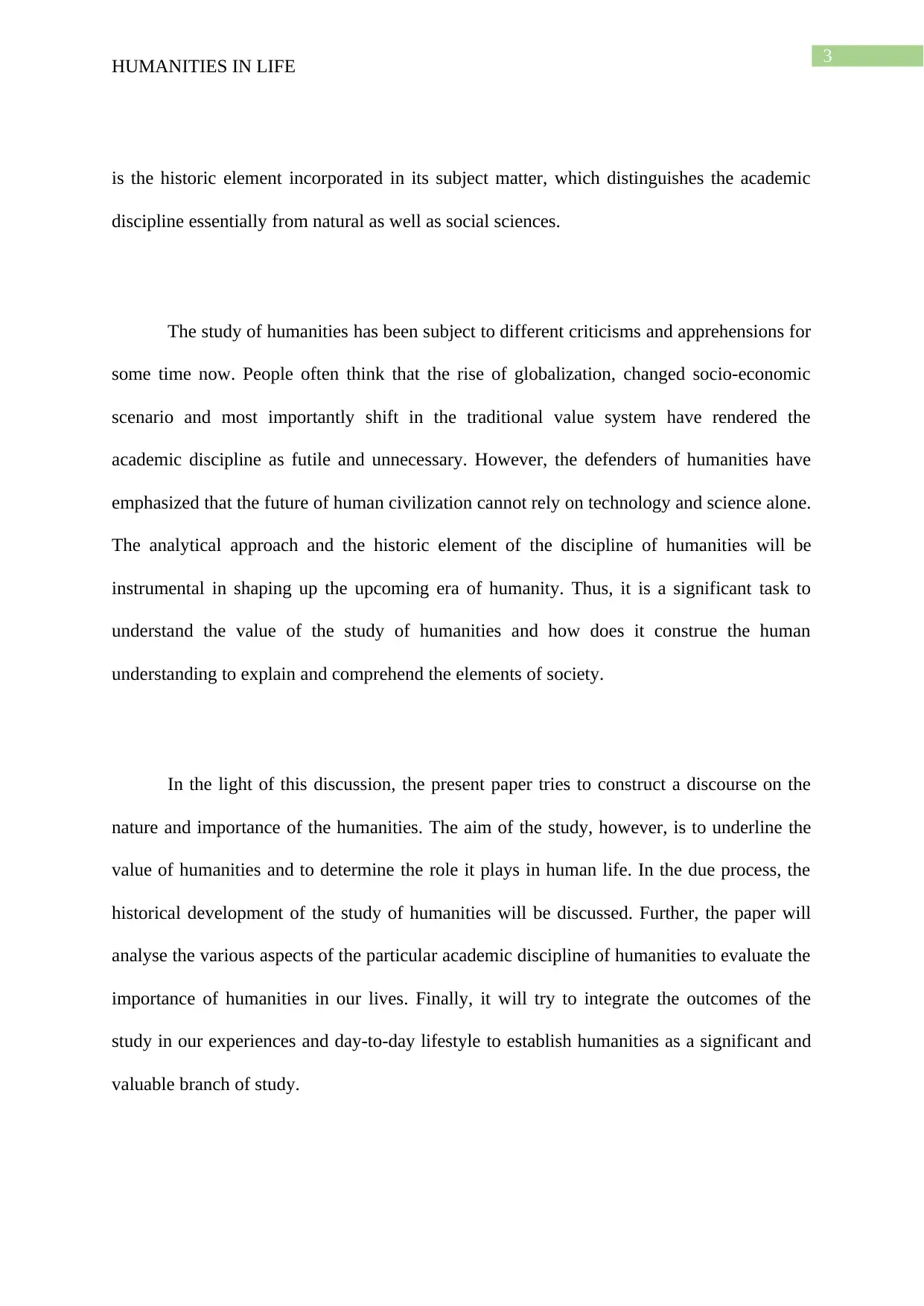
3
HUMANITIES IN LIFE
is the historic element incorporated in its subject matter, which distinguishes the academic
discipline essentially from natural as well as social sciences.
The study of humanities has been subject to different criticisms and apprehensions for
some time now. People often think that the rise of globalization, changed socio-economic
scenario and most importantly shift in the traditional value system have rendered the
academic discipline as futile and unnecessary. However, the defenders of humanities have
emphasized that the future of human civilization cannot rely on technology and science alone.
The analytical approach and the historic element of the discipline of humanities will be
instrumental in shaping up the upcoming era of humanity. Thus, it is a significant task to
understand the value of the study of humanities and how does it construe the human
understanding to explain and comprehend the elements of society.
In the light of this discussion, the present paper tries to construct a discourse on the
nature and importance of the humanities. The aim of the study, however, is to underline the
value of humanities and to determine the role it plays in human life. In the due process, the
historical development of the study of humanities will be discussed. Further, the paper will
analyse the various aspects of the particular academic discipline of humanities to evaluate the
importance of humanities in our lives. Finally, it will try to integrate the outcomes of the
study in our experiences and day-to-day lifestyle to establish humanities as a significant and
valuable branch of study.
HUMANITIES IN LIFE
is the historic element incorporated in its subject matter, which distinguishes the academic
discipline essentially from natural as well as social sciences.
The study of humanities has been subject to different criticisms and apprehensions for
some time now. People often think that the rise of globalization, changed socio-economic
scenario and most importantly shift in the traditional value system have rendered the
academic discipline as futile and unnecessary. However, the defenders of humanities have
emphasized that the future of human civilization cannot rely on technology and science alone.
The analytical approach and the historic element of the discipline of humanities will be
instrumental in shaping up the upcoming era of humanity. Thus, it is a significant task to
understand the value of the study of humanities and how does it construe the human
understanding to explain and comprehend the elements of society.
In the light of this discussion, the present paper tries to construct a discourse on the
nature and importance of the humanities. The aim of the study, however, is to underline the
value of humanities and to determine the role it plays in human life. In the due process, the
historical development of the study of humanities will be discussed. Further, the paper will
analyse the various aspects of the particular academic discipline of humanities to evaluate the
importance of humanities in our lives. Finally, it will try to integrate the outcomes of the
study in our experiences and day-to-day lifestyle to establish humanities as a significant and
valuable branch of study.
Paraphrase This Document
Need a fresh take? Get an instant paraphrase of this document with our AI Paraphraser
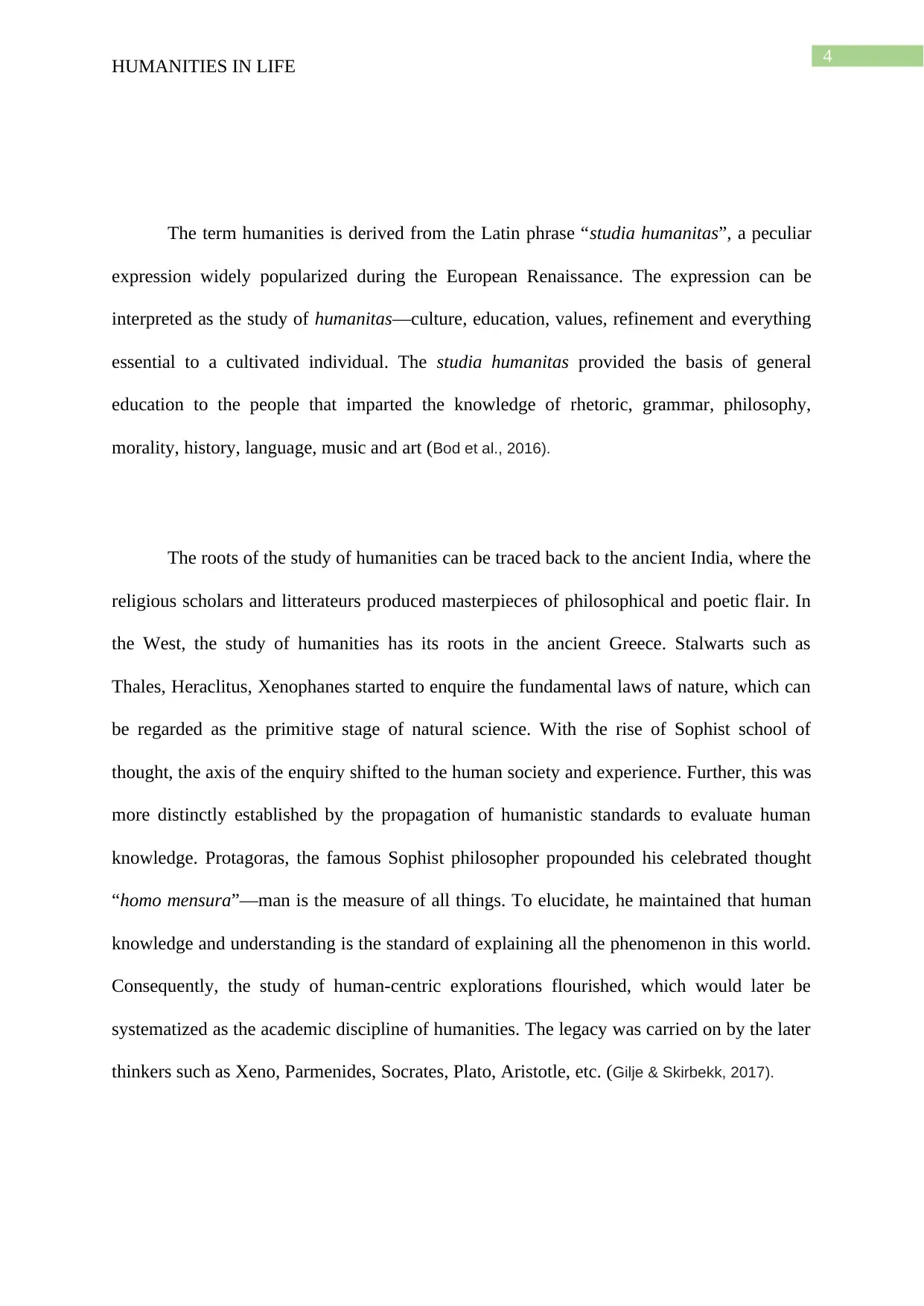
4
HUMANITIES IN LIFE
The term humanities is derived from the Latin phrase “studia humanitas”, a peculiar
expression widely popularized during the European Renaissance. The expression can be
interpreted as the study of humanitas—culture, education, values, refinement and everything
essential to a cultivated individual. The studia humanitas provided the basis of general
education to the people that imparted the knowledge of rhetoric, grammar, philosophy,
morality, history, language, music and art (Bod et al., 2016).
The roots of the study of humanities can be traced back to the ancient India, where the
religious scholars and litterateurs produced masterpieces of philosophical and poetic flair. In
the West, the study of humanities has its roots in the ancient Greece. Stalwarts such as
Thales, Heraclitus, Xenophanes started to enquire the fundamental laws of nature, which can
be regarded as the primitive stage of natural science. With the rise of Sophist school of
thought, the axis of the enquiry shifted to the human society and experience. Further, this was
more distinctly established by the propagation of humanistic standards to evaluate human
knowledge. Protagoras, the famous Sophist philosopher propounded his celebrated thought
“homo mensura”—man is the measure of all things. To elucidate, he maintained that human
knowledge and understanding is the standard of explaining all the phenomenon in this world.
Consequently, the study of human-centric explorations flourished, which would later be
systematized as the academic discipline of humanities. The legacy was carried on by the later
thinkers such as Xeno, Parmenides, Socrates, Plato, Aristotle, etc. (Gilje & Skirbekk, 2017).
HUMANITIES IN LIFE
The term humanities is derived from the Latin phrase “studia humanitas”, a peculiar
expression widely popularized during the European Renaissance. The expression can be
interpreted as the study of humanitas—culture, education, values, refinement and everything
essential to a cultivated individual. The studia humanitas provided the basis of general
education to the people that imparted the knowledge of rhetoric, grammar, philosophy,
morality, history, language, music and art (Bod et al., 2016).
The roots of the study of humanities can be traced back to the ancient India, where the
religious scholars and litterateurs produced masterpieces of philosophical and poetic flair. In
the West, the study of humanities has its roots in the ancient Greece. Stalwarts such as
Thales, Heraclitus, Xenophanes started to enquire the fundamental laws of nature, which can
be regarded as the primitive stage of natural science. With the rise of Sophist school of
thought, the axis of the enquiry shifted to the human society and experience. Further, this was
more distinctly established by the propagation of humanistic standards to evaluate human
knowledge. Protagoras, the famous Sophist philosopher propounded his celebrated thought
“homo mensura”—man is the measure of all things. To elucidate, he maintained that human
knowledge and understanding is the standard of explaining all the phenomenon in this world.
Consequently, the study of human-centric explorations flourished, which would later be
systematized as the academic discipline of humanities. The legacy was carried on by the later
thinkers such as Xeno, Parmenides, Socrates, Plato, Aristotle, etc. (Gilje & Skirbekk, 2017).
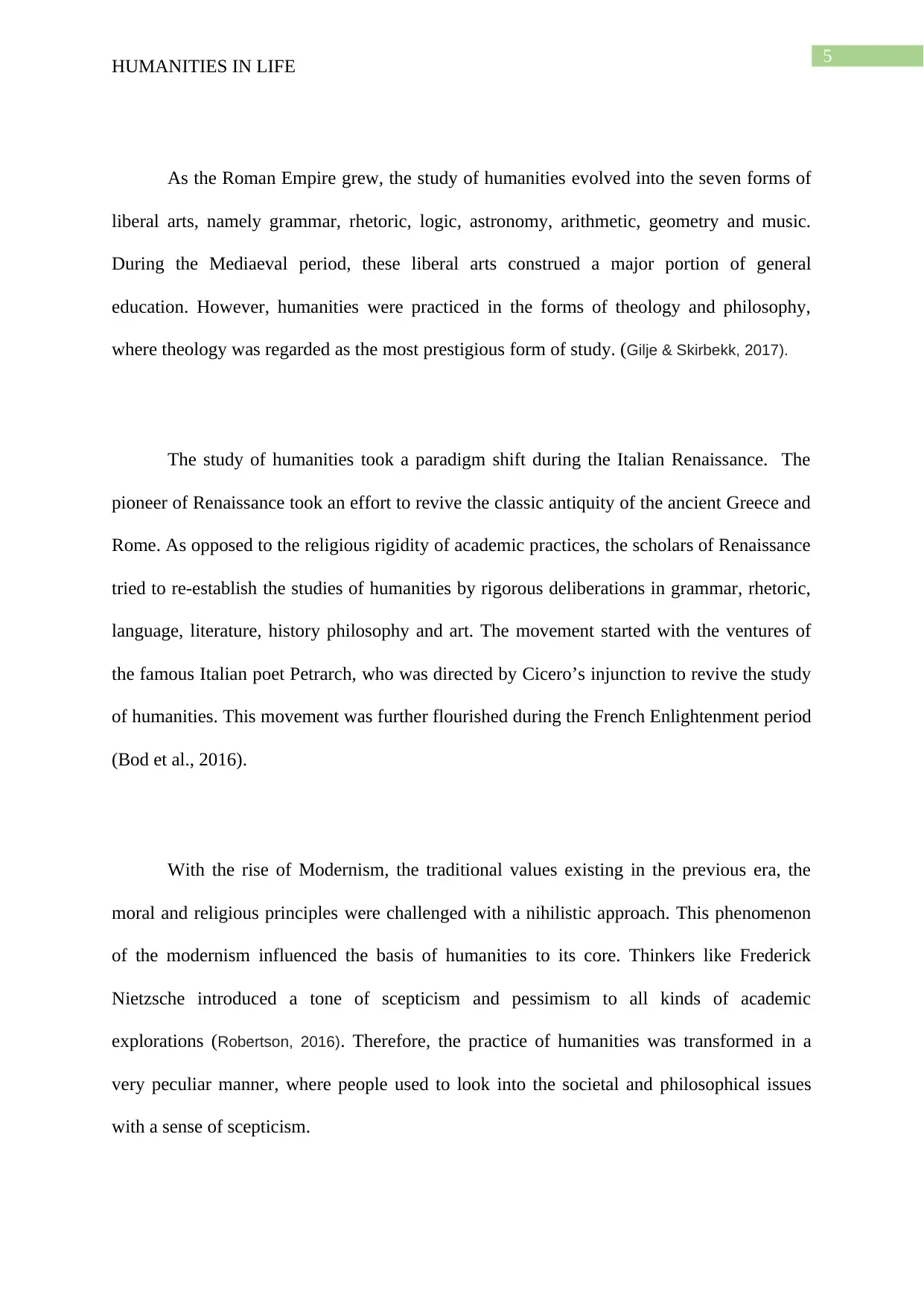
5
HUMANITIES IN LIFE
As the Roman Empire grew, the study of humanities evolved into the seven forms of
liberal arts, namely grammar, rhetoric, logic, astronomy, arithmetic, geometry and music.
During the Mediaeval period, these liberal arts construed a major portion of general
education. However, humanities were practiced in the forms of theology and philosophy,
where theology was regarded as the most prestigious form of study. (Gilje & Skirbekk, 2017).
The study of humanities took a paradigm shift during the Italian Renaissance. The
pioneer of Renaissance took an effort to revive the classic antiquity of the ancient Greece and
Rome. As opposed to the religious rigidity of academic practices, the scholars of Renaissance
tried to re-establish the studies of humanities by rigorous deliberations in grammar, rhetoric,
language, literature, history philosophy and art. The movement started with the ventures of
the famous Italian poet Petrarch, who was directed by Cicero’s injunction to revive the study
of humanities. This movement was further flourished during the French Enlightenment period
(Bod et al., 2016).
With the rise of Modernism, the traditional values existing in the previous era, the
moral and religious principles were challenged with a nihilistic approach. This phenomenon
of the modernism influenced the basis of humanities to its core. Thinkers like Frederick
Nietzsche introduced a tone of scepticism and pessimism to all kinds of academic
explorations (Robertson, 2016). Therefore, the practice of humanities was transformed in a
very peculiar manner, where people used to look into the societal and philosophical issues
with a sense of scepticism.
HUMANITIES IN LIFE
As the Roman Empire grew, the study of humanities evolved into the seven forms of
liberal arts, namely grammar, rhetoric, logic, astronomy, arithmetic, geometry and music.
During the Mediaeval period, these liberal arts construed a major portion of general
education. However, humanities were practiced in the forms of theology and philosophy,
where theology was regarded as the most prestigious form of study. (Gilje & Skirbekk, 2017).
The study of humanities took a paradigm shift during the Italian Renaissance. The
pioneer of Renaissance took an effort to revive the classic antiquity of the ancient Greece and
Rome. As opposed to the religious rigidity of academic practices, the scholars of Renaissance
tried to re-establish the studies of humanities by rigorous deliberations in grammar, rhetoric,
language, literature, history philosophy and art. The movement started with the ventures of
the famous Italian poet Petrarch, who was directed by Cicero’s injunction to revive the study
of humanities. This movement was further flourished during the French Enlightenment period
(Bod et al., 2016).
With the rise of Modernism, the traditional values existing in the previous era, the
moral and religious principles were challenged with a nihilistic approach. This phenomenon
of the modernism influenced the basis of humanities to its core. Thinkers like Frederick
Nietzsche introduced a tone of scepticism and pessimism to all kinds of academic
explorations (Robertson, 2016). Therefore, the practice of humanities was transformed in a
very peculiar manner, where people used to look into the societal and philosophical issues
with a sense of scepticism.
⊘ This is a preview!⊘
Do you want full access?
Subscribe today to unlock all pages.

Trusted by 1+ million students worldwide
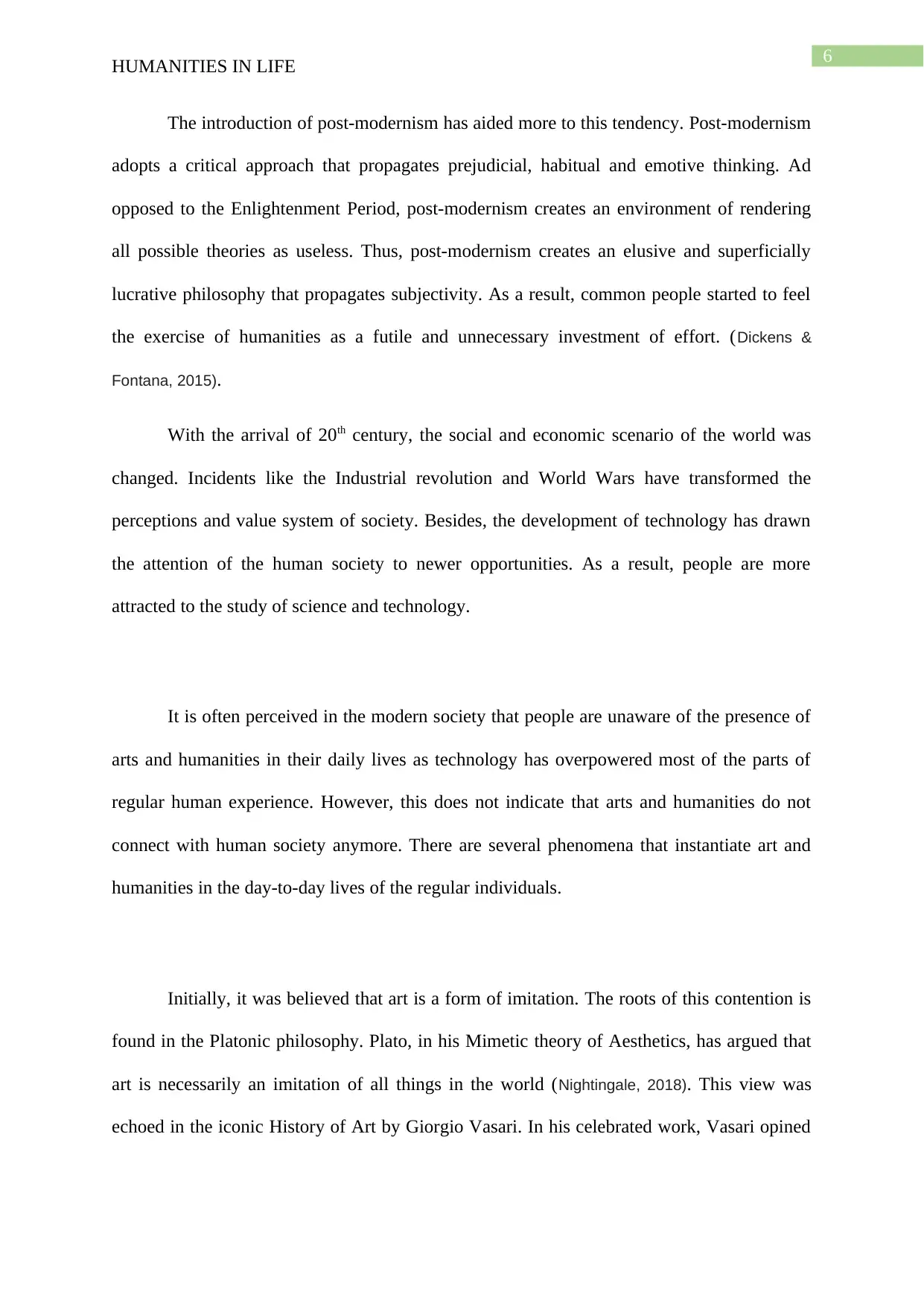
6
HUMANITIES IN LIFE
The introduction of post-modernism has aided more to this tendency. Post-modernism
adopts a critical approach that propagates prejudicial, habitual and emotive thinking. Ad
opposed to the Enlightenment Period, post-modernism creates an environment of rendering
all possible theories as useless. Thus, post-modernism creates an elusive and superficially
lucrative philosophy that propagates subjectivity. As a result, common people started to feel
the exercise of humanities as a futile and unnecessary investment of effort. (Dickens &
Fontana, 2015).
With the arrival of 20th century, the social and economic scenario of the world was
changed. Incidents like the Industrial revolution and World Wars have transformed the
perceptions and value system of society. Besides, the development of technology has drawn
the attention of the human society to newer opportunities. As a result, people are more
attracted to the study of science and technology.
It is often perceived in the modern society that people are unaware of the presence of
arts and humanities in their daily lives as technology has overpowered most of the parts of
regular human experience. However, this does not indicate that arts and humanities do not
connect with human society anymore. There are several phenomena that instantiate art and
humanities in the day-to-day lives of the regular individuals.
Initially, it was believed that art is a form of imitation. The roots of this contention is
found in the Platonic philosophy. Plato, in his Mimetic theory of Aesthetics, has argued that
art is necessarily an imitation of all things in the world (Nightingale, 2018). This view was
echoed in the iconic History of Art by Giorgio Vasari. In his celebrated work, Vasari opined
HUMANITIES IN LIFE
The introduction of post-modernism has aided more to this tendency. Post-modernism
adopts a critical approach that propagates prejudicial, habitual and emotive thinking. Ad
opposed to the Enlightenment Period, post-modernism creates an environment of rendering
all possible theories as useless. Thus, post-modernism creates an elusive and superficially
lucrative philosophy that propagates subjectivity. As a result, common people started to feel
the exercise of humanities as a futile and unnecessary investment of effort. (Dickens &
Fontana, 2015).
With the arrival of 20th century, the social and economic scenario of the world was
changed. Incidents like the Industrial revolution and World Wars have transformed the
perceptions and value system of society. Besides, the development of technology has drawn
the attention of the human society to newer opportunities. As a result, people are more
attracted to the study of science and technology.
It is often perceived in the modern society that people are unaware of the presence of
arts and humanities in their daily lives as technology has overpowered most of the parts of
regular human experience. However, this does not indicate that arts and humanities do not
connect with human society anymore. There are several phenomena that instantiate art and
humanities in the day-to-day lives of the regular individuals.
Initially, it was believed that art is a form of imitation. The roots of this contention is
found in the Platonic philosophy. Plato, in his Mimetic theory of Aesthetics, has argued that
art is necessarily an imitation of all things in the world (Nightingale, 2018). This view was
echoed in the iconic History of Art by Giorgio Vasari. In his celebrated work, Vasari opined
Paraphrase This Document
Need a fresh take? Get an instant paraphrase of this document with our AI Paraphraser
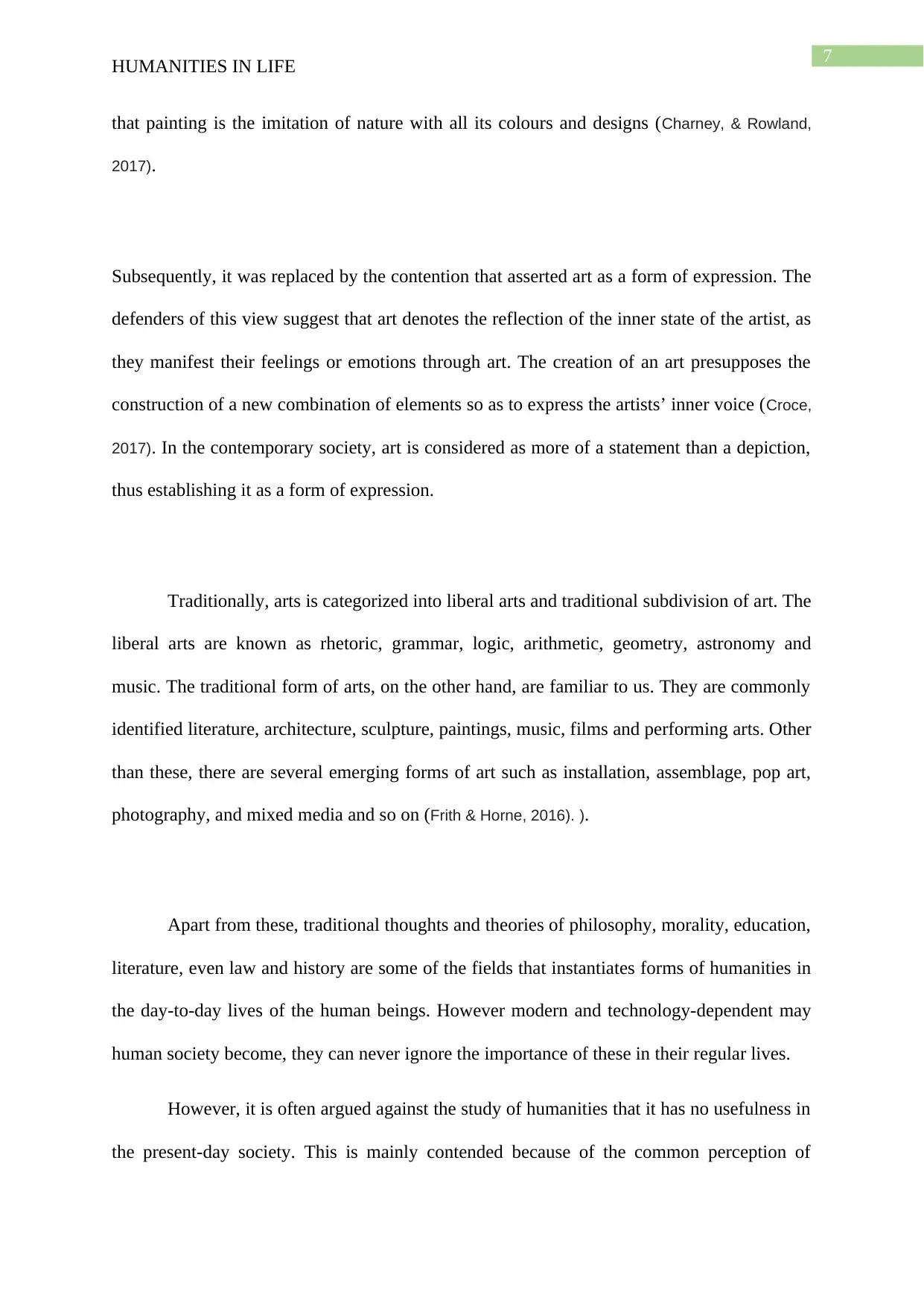
7
HUMANITIES IN LIFE
that painting is the imitation of nature with all its colours and designs (Charney, & Rowland,
2017).
Subsequently, it was replaced by the contention that asserted art as a form of expression. The
defenders of this view suggest that art denotes the reflection of the inner state of the artist, as
they manifest their feelings or emotions through art. The creation of an art presupposes the
construction of a new combination of elements so as to express the artists’ inner voice (Croce,
2017). In the contemporary society, art is considered as more of a statement than a depiction,
thus establishing it as a form of expression.
Traditionally, arts is categorized into liberal arts and traditional subdivision of art. The
liberal arts are known as rhetoric, grammar, logic, arithmetic, geometry, astronomy and
music. The traditional form of arts, on the other hand, are familiar to us. They are commonly
identified literature, architecture, sculpture, paintings, music, films and performing arts. Other
than these, there are several emerging forms of art such as installation, assemblage, pop art,
photography, and mixed media and so on (Frith & Horne, 2016). ).
Apart from these, traditional thoughts and theories of philosophy, morality, education,
literature, even law and history are some of the fields that instantiates forms of humanities in
the day-to-day lives of the human beings. However modern and technology-dependent may
human society become, they can never ignore the importance of these in their regular lives.
However, it is often argued against the study of humanities that it has no usefulness in
the present-day society. This is mainly contended because of the common perception of
HUMANITIES IN LIFE
that painting is the imitation of nature with all its colours and designs (Charney, & Rowland,
2017).
Subsequently, it was replaced by the contention that asserted art as a form of expression. The
defenders of this view suggest that art denotes the reflection of the inner state of the artist, as
they manifest their feelings or emotions through art. The creation of an art presupposes the
construction of a new combination of elements so as to express the artists’ inner voice (Croce,
2017). In the contemporary society, art is considered as more of a statement than a depiction,
thus establishing it as a form of expression.
Traditionally, arts is categorized into liberal arts and traditional subdivision of art. The
liberal arts are known as rhetoric, grammar, logic, arithmetic, geometry, astronomy and
music. The traditional form of arts, on the other hand, are familiar to us. They are commonly
identified literature, architecture, sculpture, paintings, music, films and performing arts. Other
than these, there are several emerging forms of art such as installation, assemblage, pop art,
photography, and mixed media and so on (Frith & Horne, 2016). ).
Apart from these, traditional thoughts and theories of philosophy, morality, education,
literature, even law and history are some of the fields that instantiates forms of humanities in
the day-to-day lives of the human beings. However modern and technology-dependent may
human society become, they can never ignore the importance of these in their regular lives.
However, it is often argued against the study of humanities that it has no usefulness in
the present-day society. This is mainly contended because of the common perception of
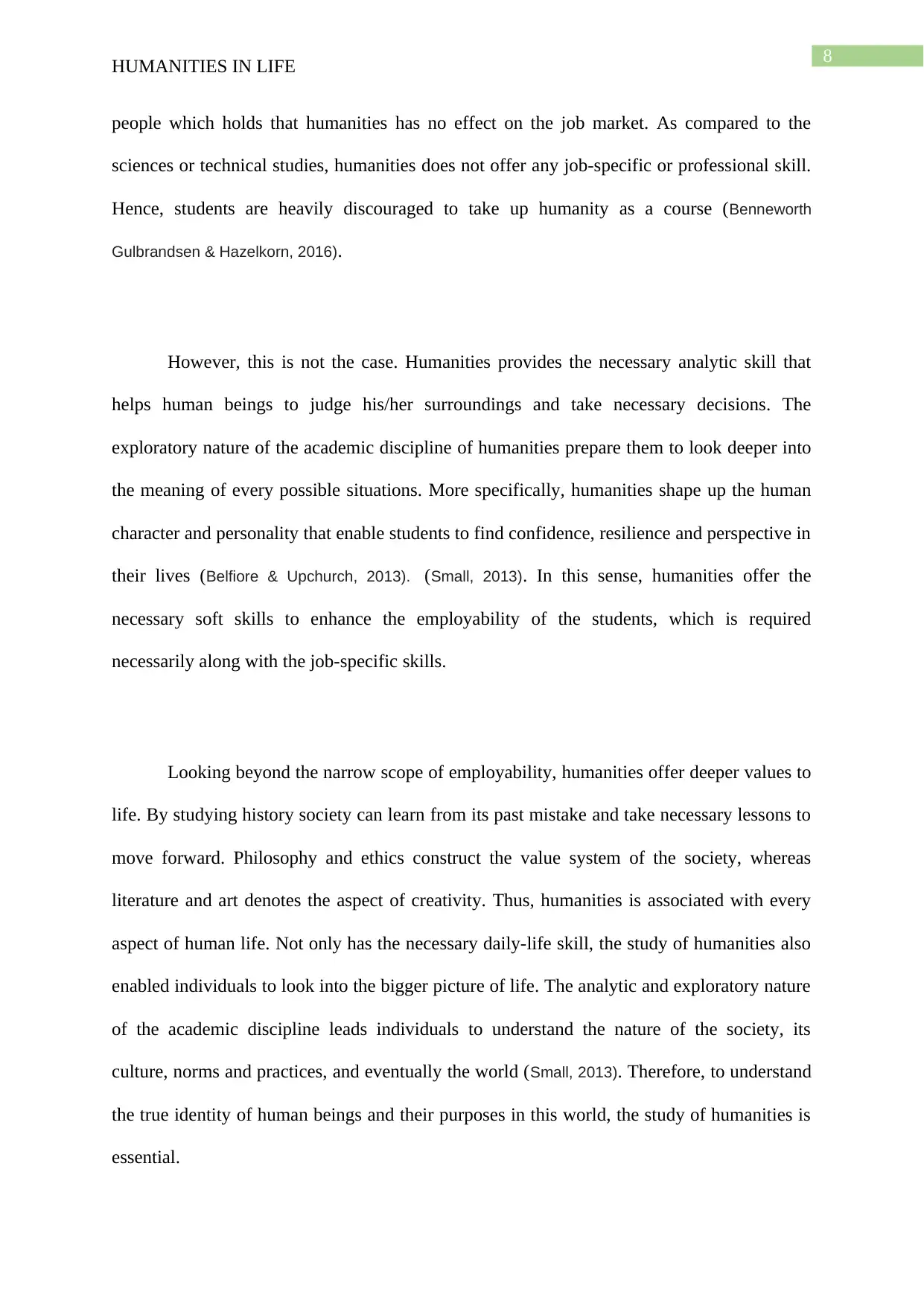
8
HUMANITIES IN LIFE
people which holds that humanities has no effect on the job market. As compared to the
sciences or technical studies, humanities does not offer any job-specific or professional skill.
Hence, students are heavily discouraged to take up humanity as a course (Benneworth
Gulbrandsen & Hazelkorn, 2016).
However, this is not the case. Humanities provides the necessary analytic skill that
helps human beings to judge his/her surroundings and take necessary decisions. The
exploratory nature of the academic discipline of humanities prepare them to look deeper into
the meaning of every possible situations. More specifically, humanities shape up the human
character and personality that enable students to find confidence, resilience and perspective in
their lives (Belfiore & Upchurch, 2013). (Small, 2013). In this sense, humanities offer the
necessary soft skills to enhance the employability of the students, which is required
necessarily along with the job-specific skills.
Looking beyond the narrow scope of employability, humanities offer deeper values to
life. By studying history society can learn from its past mistake and take necessary lessons to
move forward. Philosophy and ethics construct the value system of the society, whereas
literature and art denotes the aspect of creativity. Thus, humanities is associated with every
aspect of human life. Not only has the necessary daily-life skill, the study of humanities also
enabled individuals to look into the bigger picture of life. The analytic and exploratory nature
of the academic discipline leads individuals to understand the nature of the society, its
culture, norms and practices, and eventually the world (Small, 2013). Therefore, to understand
the true identity of human beings and their purposes in this world, the study of humanities is
essential.
HUMANITIES IN LIFE
people which holds that humanities has no effect on the job market. As compared to the
sciences or technical studies, humanities does not offer any job-specific or professional skill.
Hence, students are heavily discouraged to take up humanity as a course (Benneworth
Gulbrandsen & Hazelkorn, 2016).
However, this is not the case. Humanities provides the necessary analytic skill that
helps human beings to judge his/her surroundings and take necessary decisions. The
exploratory nature of the academic discipline of humanities prepare them to look deeper into
the meaning of every possible situations. More specifically, humanities shape up the human
character and personality that enable students to find confidence, resilience and perspective in
their lives (Belfiore & Upchurch, 2013). (Small, 2013). In this sense, humanities offer the
necessary soft skills to enhance the employability of the students, which is required
necessarily along with the job-specific skills.
Looking beyond the narrow scope of employability, humanities offer deeper values to
life. By studying history society can learn from its past mistake and take necessary lessons to
move forward. Philosophy and ethics construct the value system of the society, whereas
literature and art denotes the aspect of creativity. Thus, humanities is associated with every
aspect of human life. Not only has the necessary daily-life skill, the study of humanities also
enabled individuals to look into the bigger picture of life. The analytic and exploratory nature
of the academic discipline leads individuals to understand the nature of the society, its
culture, norms and practices, and eventually the world (Small, 2013). Therefore, to understand
the true identity of human beings and their purposes in this world, the study of humanities is
essential.
⊘ This is a preview!⊘
Do you want full access?
Subscribe today to unlock all pages.

Trusted by 1+ million students worldwide
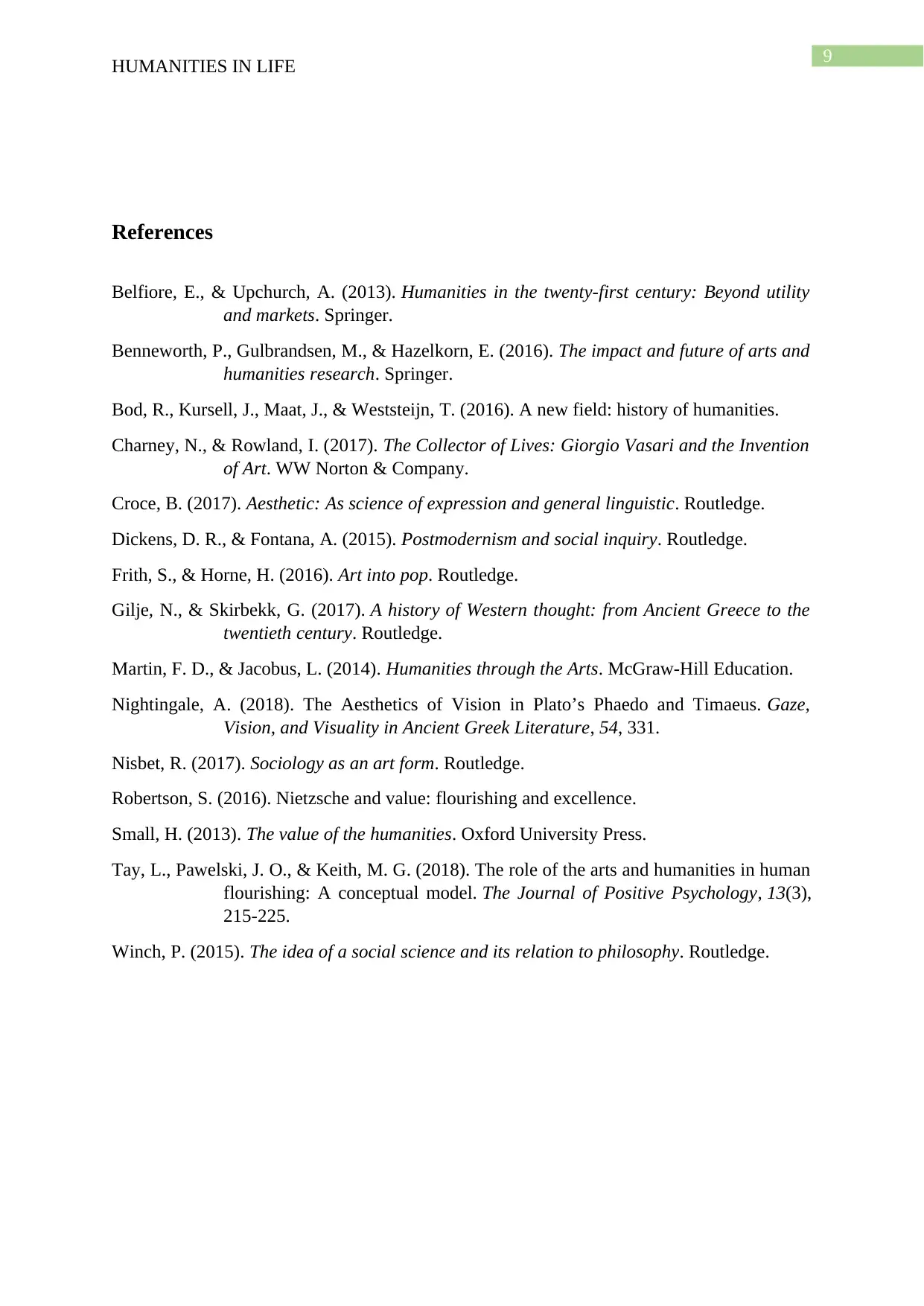
9
HUMANITIES IN LIFE
References
Belfiore, E., & Upchurch, A. (2013). Humanities in the twenty-first century: Beyond utility
and markets. Springer.
Benneworth, P., Gulbrandsen, M., & Hazelkorn, E. (2016). The impact and future of arts and
humanities research. Springer.
Bod, R., Kursell, J., Maat, J., & Weststeijn, T. (2016). A new field: history of humanities.
Charney, N., & Rowland, I. (2017). The Collector of Lives: Giorgio Vasari and the Invention
of Art. WW Norton & Company.
Croce, B. (2017). Aesthetic: As science of expression and general linguistic. Routledge.
Dickens, D. R., & Fontana, A. (2015). Postmodernism and social inquiry. Routledge.
Frith, S., & Horne, H. (2016). Art into pop. Routledge.
Gilje, N., & Skirbekk, G. (2017). A history of Western thought: from Ancient Greece to the
twentieth century. Routledge.
Martin, F. D., & Jacobus, L. (2014). Humanities through the Arts. McGraw-Hill Education.
Nightingale, A. (2018). The Aesthetics of Vision in Plato’s Phaedo and Timaeus. Gaze,
Vision, and Visuality in Ancient Greek Literature, 54, 331.
Nisbet, R. (2017). Sociology as an art form. Routledge.
Robertson, S. (2016). Nietzsche and value: flourishing and excellence.
Small, H. (2013). The value of the humanities. Oxford University Press.
Tay, L., Pawelski, J. O., & Keith, M. G. (2018). The role of the arts and humanities in human
flourishing: A conceptual model. The Journal of Positive Psychology, 13(3),
215-225.
Winch, P. (2015). The idea of a social science and its relation to philosophy. Routledge.
HUMANITIES IN LIFE
References
Belfiore, E., & Upchurch, A. (2013). Humanities in the twenty-first century: Beyond utility
and markets. Springer.
Benneworth, P., Gulbrandsen, M., & Hazelkorn, E. (2016). The impact and future of arts and
humanities research. Springer.
Bod, R., Kursell, J., Maat, J., & Weststeijn, T. (2016). A new field: history of humanities.
Charney, N., & Rowland, I. (2017). The Collector of Lives: Giorgio Vasari and the Invention
of Art. WW Norton & Company.
Croce, B. (2017). Aesthetic: As science of expression and general linguistic. Routledge.
Dickens, D. R., & Fontana, A. (2015). Postmodernism and social inquiry. Routledge.
Frith, S., & Horne, H. (2016). Art into pop. Routledge.
Gilje, N., & Skirbekk, G. (2017). A history of Western thought: from Ancient Greece to the
twentieth century. Routledge.
Martin, F. D., & Jacobus, L. (2014). Humanities through the Arts. McGraw-Hill Education.
Nightingale, A. (2018). The Aesthetics of Vision in Plato’s Phaedo and Timaeus. Gaze,
Vision, and Visuality in Ancient Greek Literature, 54, 331.
Nisbet, R. (2017). Sociology as an art form. Routledge.
Robertson, S. (2016). Nietzsche and value: flourishing and excellence.
Small, H. (2013). The value of the humanities. Oxford University Press.
Tay, L., Pawelski, J. O., & Keith, M. G. (2018). The role of the arts and humanities in human
flourishing: A conceptual model. The Journal of Positive Psychology, 13(3),
215-225.
Winch, P. (2015). The idea of a social science and its relation to philosophy. Routledge.
1 out of 10
Related Documents
Your All-in-One AI-Powered Toolkit for Academic Success.
+13062052269
info@desklib.com
Available 24*7 on WhatsApp / Email
![[object Object]](/_next/static/media/star-bottom.7253800d.svg)
Unlock your academic potential
Copyright © 2020–2025 A2Z Services. All Rights Reserved. Developed and managed by ZUCOL.





